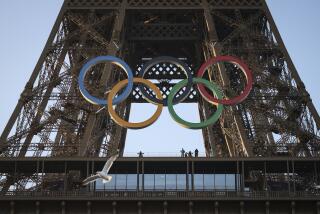Viewership is up for Games
- Share via
NEW YORK — Going into the 2004 Summer Olympics, advertisers and media analysts worried that distractions including athlete doping scandals and intense security would scare away viewers. The outlook wasn’t helped when initial coverage featured empty stadium seats and an early loss by much-hyped U.S. swimmer Michael Phelps.
But at the halfway point, NBC looks to have turned itself from ratings underdog to success story. Through Saturday night, according to preliminary numbers from Nielsen Media Research, NBC’s prime-time coverage from Athens on its main NBC network was up 14%, compared with the equivalent nine-day period for the 2000 Sydney Olympics, to an average 26.2 million viewers, from 22.9 million for Sydney.
NBC was confident enough in the numbers last week to release for sale some of the ad time it had held back in case there was a shortfall and it had to “make good” some time to advertisers. While Olympic viewership traditionally levels off in the second week, NBC said it was encouraged that the second Saturday night improved on the first.
NBC and the advertisers “have definitely got to be happy with the results so far,” said Jason Maltby, co-executive director of national TV for MindShare, a media buying agency whose clients include official Olympic sponsor Kodak. “It seems to be a little better broadcast,” he said. In the past, he added, there had been “too many canned profiles that seemed to go on too long. This time, they seem to be focusing on the real drama of the sports.”
One surprise, Maltby said, is that the saturation cable coverage -- NBC is providing 1,210 hours of coverage on all its platforms, compared with 440 hours for Sydney -- hasn’t diluted the audience for prime time. NBC said that, in fact, cable appears to be drawing viewers who want to watch sports that in the past wouldn’t have been televised. Then, through aggressive cross-promotion, the producers are getting those cable viewers to tune in to the prime-time NBC broadcast.
Likewise, heavy traffic to NBC’s Olympic website appears to be pushing audiences to watch, rather than driving them away because they know the results. Although the 2000 Olympics were shown on tape delay -- as are this year’s Games -- Sydney matches were shown with a 15-hour delay rather than the seven-hour delay from Athens.
“It’s relatively fresh news, rather than old news,” said a report from another media buying agency, Magna Global USA, which added that “hearing about the close contests and American successes could be causing more people to tune in.”
Maltby said NBC still has to go the distance, however. “This is live sports, and anything can happen. Once you get beyond the swimming and gymnastics and start relying on track and field, you’ve still got to wonder if that audience is going to stay there. Other potential worries are: Will they lose the drama and will people get sick of it? It’s a 17-day commitment.”
NBC attributed the improvement to a number of factors. For one thing, the Games are being held in August, when children are out of school and adults are more likely to be on vacation, instead of during September, as they were in Sydney. Perhaps more significant has been the performance of U.S. athletes and some dramatic story lines.
NBC said its executives weren’t available for interviews. Dick Ebersol, chairman of NBC Universal Sports & Olympics, said Friday through a spokeswoman that “it’s always about the athletes. Here, the U.S. has had great teams in both swimming and gymnastics. In Sydney, it was only swimming.”
More to Read
Go beyond the scoreboard
Get the latest on L.A.'s teams in the daily Sports Report newsletter.
You may occasionally receive promotional content from the Los Angeles Times.






